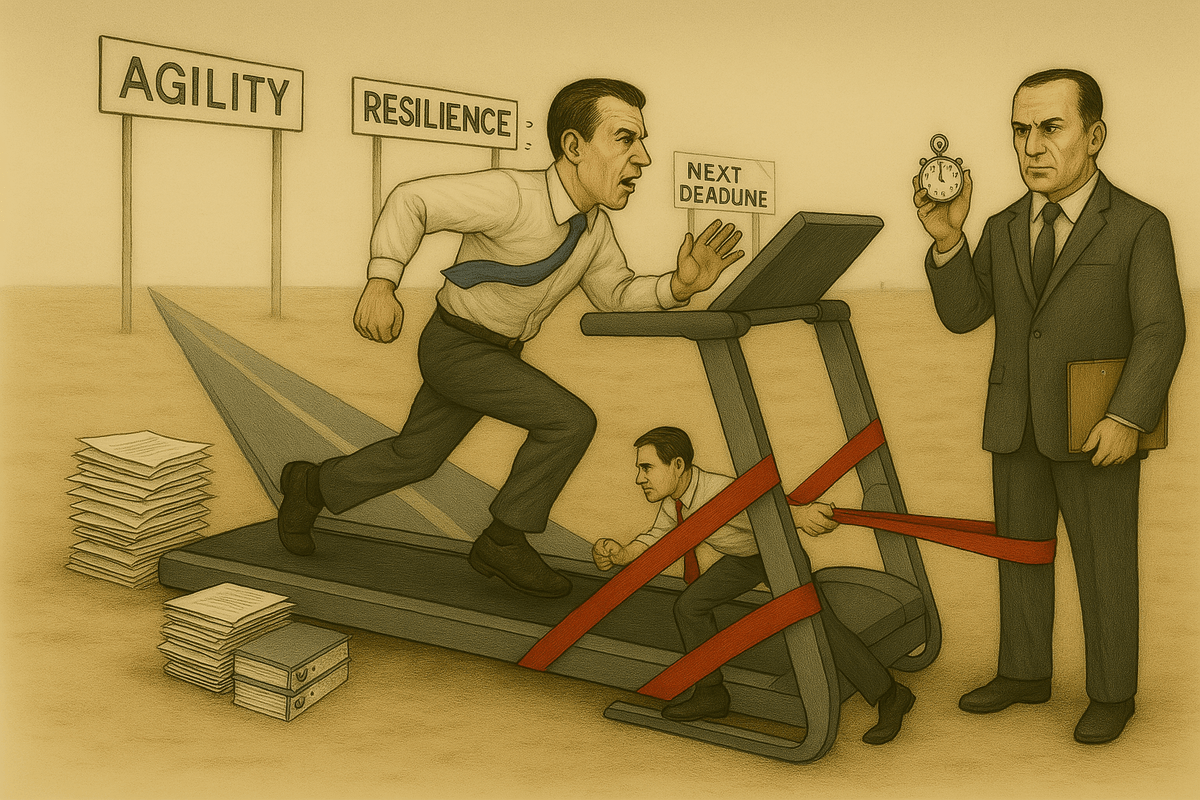“Well, it worked for me.”
That’s the unspoken refrain behind so many decisions.
A single success story held up like proof—while a dozen silent failures are swept off the table.
So much effort goes into designing “ideal” systems—whiteboards, workshops, tidy templates.
But too often, those systems are built by the well-fed, for the already-standing.
The result?
A policy that reads like a puzzle.
A guideline that only makes sense if you helped write it.
And a safety net strung so high, no one falling can reach it.
Because behind every rollout is a person quietly asking:
“Wait—am I even allowed to do this?”

🎭 Act I: The Overkill Clause
“Personnel shall engage in credential rotation activities pursuant to subsection 3.a(iv), aligning with procedural timeframes not exceeding ninety (90) days.”
👀 Interpretation moment:
"...so do I need to change my password or summon a lawyer?"
✅ Better:
Change your password every 90 days. You’ll thank us later.
Worked for me.
But what actually worked?
📉 Act II: The Equity Maze
“We are committed to proactive inclusion strategies via distributed equity frameworks designed to normalize diverse stakeholder input across operational silos.”
👀 Interpretation moment:
"Wait—are we including people or analyzing them?"
✅ Better:
Ask who’s not in the room—and invite them in, early.
Worked for me.
But what actually worked? The framework? Or the fact you were already at the table?

🔒 Act III: The Risky Script
“Risk posture calibration shall be conducted using legacy-adjusted benchmarks to ensure a zero-deviation tolerance across variable assets.”
👀 Interpretation moment:
"Is this about laptops or yoga?"
✅ Better:
Check what could go wrong. Fix what you can. Stay flexible.
Worked for me.
But what actually worked? The risk strategy—or the safety net you didn’t see?
🏃♀️ Scene Rerun: Endless Sprint, Shifting Finish Lines
You reverse-engineered the outcome.
You adjusted, improvised, sprinted toward a moving goalpost.
Then it moved again.
Every week, a new target. No brief. No context. Just urgency.
So you kept running—tired, under-resourced, second-guessing every step.
You collapsed.
And they said, “Guess you couldn’t handle the pressure.”
Because that’s how power avoids reflection:
By creating a race, and blaming exhaustion on the runner.
Worked for me.
But what actually worked? The sprint? Or never having to run at all?

🐴 Postscript: The Donkey and the Horse
The donkey staggered under the weight—
Load after load added with expectation, not care.
When its back broke, they called it weak.
No one asked who kept piling more on.
Then a horse trotted past—unburdened, well-fed, free.
It could have helped. But no one stopped it.
No one even considered asking.
Because those who’ve never had to bear the weight
are rarely expected to share it.
And the system remains balanced—
but only for those who were never meant to carry anything at all.
Worked for me.
But what actually worked? The horse? Or the silence that let it pass by untouched?

🍕🔥 Bonus Scene: The Great Appliance Switch (With Extra Recipes and Zero Instructions)
You had an oven.
You made a cake.
It wasn’t perfect, but it held together.
Then a new boss arrived and said,
"Actually, we’re doing pizza now."
No ingredients.
No instructions.
Just a shrug and a smile.
So you scramble.
You pivot.
You stretch the last of what you’ve got—somehow.
And the next week?
New cake.
New shape.
Still no instructions.
Still your responsibility.
Now you’re out of ingredients, out of credit, and being told to “just be more adaptable”
—as if failure was a choice.
—as if anyone could bake under those conditions.
“Bake This. Now This. Why Are You Crying?”
And just as you steady yourself for the next task,
the boss returns—gesturing at crumbs and flour on the floor.
"Actually," he says, "you’d be more useful as a cleaner."
No apology.
No recognition.
Just a downgrade wrapped in faux opportunity.
Meanwhile, the boss sits at a table stacked high—
full of cake.
Every kind. Still warm. Still whole.
Baffled by your lack of success.
Because for some, the feast is inherited.
And for others, even crumbs feel conditional.
Not everyone starts with the same pantry.
But policy too often assumes they do—
and blames those left hungry for not being better chefs.
Exposure. The Great unknown.
These are the voyages of Random Circuits, boldly entering the arena of ideas that disrupt, challenge, and transform.

🍽️ Final Slice: What Worked, and Who Gets to Say So
"Well, it worked for me."
"It works for my friends too."
Great. And who are your friends?
The ones with matching ties?
The ones with baked-in access, safety nets, and inherited ovens?
The ones who look like you, sound like you, and get invited in before the doors even open?
Because if your proof of success is an echo chamber of privilege, then guess what—
you’re not describing a functional system. You’re describing a club.
Don’t talk about resilience from a fully stocked pantry.
Don’t praise adaptability when others are rebuilding from crumbs.
And don’t pretend silence equals consent—some people aren’t heard because the system talks over them.
You want to know why the recipe didn’t hold?
Because you changed the rules mid-mix, handed down empty bowls, and called it innovation.
Worked for me.
Worked for my friends too.
But your friends aren’t the test. They’re the default.
And if it only works for them, then it doesn’t work at all.

